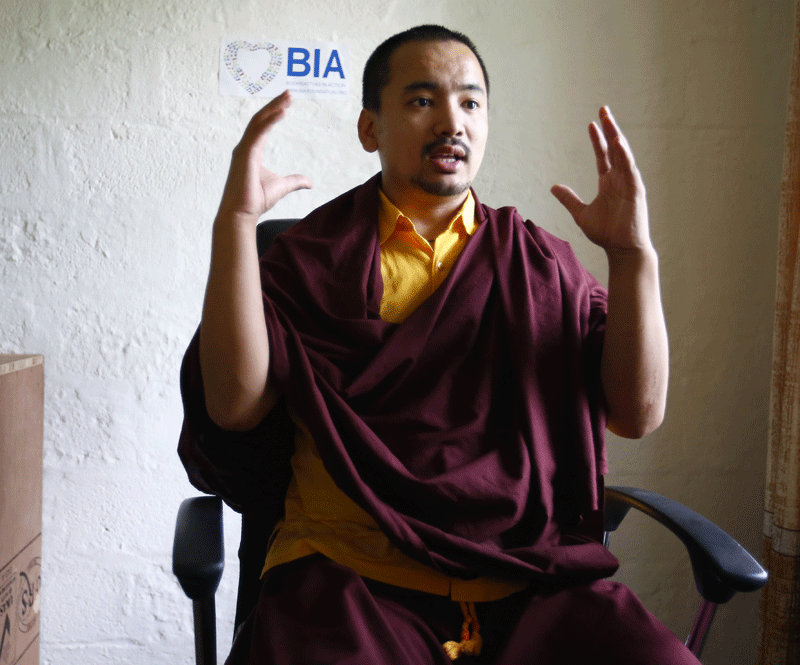Life of dignity
The physically-challenged are usually taken as a burden in the family and are treated as ‘garbage’. This is why I always wanted to work for them
Kathmandu
Life unfolds its mysteries as we live it. We do not even know what the next second has in store for us. The late songstress Tara Devi has sung about this uncertainty of life — Soche jasto hunna jivan, Samjhe jasto hunna jivan (Life doesn’t go as expected, it isn’t even as we remember it). If we knew beforehand that something bad would befall us, we would try to avoid that situation at all costs. Life would be blissful if only there were rewind and fast-forward buttons, but life is not a digitised gadget.
Determined Nar Bahadur migrated to Kathmandu as “I knew there were organisations which helped physically-challenged people”. Staying at the Nepal Disabled Association, Jorpati, Nar Bahadur learnt to make bamboo items. “I started making tokari, doko (varieties of bamboo baskets) and various other bamboo items and made a living.” These days he has started weaving mudha (stool) too.
After her accident, Khanal stayed in the hospital for around eight months. Finding it difficult to live, she felt alone. But when she saw other visually-challenged, those with hearing difficulty and the physically-challenged, she felt she too can do something in her life. “It was difficult during those days, but I consoled myself and started taking training in tailoring in Baneshwor. Since then there has been no turning back,” she said.
Khanal took further trainings to polish her skills. “I stitch ladies’ clothing items. I also like to stitch thaili — a traditional purse — and other fancy items like bags, purses as they are unique and attractive.”
I was a sportsman playing Siterio Karate and was learning music but I had to quit playing when I met with the accident in 2008...
Chhiri took training in computer and candle making during his stay of around two years in the Spinal Injury Rehabilitation Centre, Jorpati, but he lost his interest in both. The life of his uncle Dakipa Sherpa, who stayed home painting thangkas attracted Chhiri. “I felt I could do it too. I started to learn to paint thangkas with my teacher Nwawang Ko Cha in Bouddha,” shared Chhiri.
Today he teaches other physically-challenged people the art of thangka painting. He is able to make a living and take care of his family with the money earned from his work.
As for Prashan, “I started taking training in making idols”. He makes idols of Buddha, Tara, Radha Krishna, laughing Buddha among others from white cement and other materials.
The challenges
Though these individuals have overcome the greatest tragedy of their life with strength and determination, life is still difficult for them. Khanal finds it difficult to travel in vehicles due to the chaos inside. “I must protect my head from banging,” she said. It is also difficult for Khanal to work long hours because of her head and as such she is unable to open a tailoring centre of her own. “But if someone assists me, I have plans,” she smiled.
It is difficult to do all activities for visually-challenged Nar Bahadur. “I can’t make the designs as I can’t see them. I just can weave,” he said.
There is difficulty in making bigger idols as one needs to stand to do so. “This is what I can’t do. I need the help of others to take out the idols kept on the upper part of the shelf,” Prashan said.
Thangkas can be painted sitting in a wheelchair. “There aren’t many difficulties as I have started living with it. But there are difficulties outside. As there are no wheelchair-friendly buildings and roads in the country, it is difficult for people like us to move around,” Chhiri informed.
Meaning of life
They however want to live fulfilling lives taking such challenges in their stride. “Life is an excuse to live. It is just an excuse to spend time. But one must do something so that people recognise you,” smiled Khanal.
Aashu aashu hunna jivan khushi khusi hunna jivan
Vetyo jasle ustai hunchha, roje jasto hunna jivan
(Life isn’t only tears, neither is it just joy; It is as one gets, one can’t make a choice)
Nar Bahadur too feels his life is like the lines of the song. “You can’t make a choice in your life. But to live as a human, you need to work,”
he said.
The man behind
Born in Kathmandu some 31 years ago, Chogyal Rinpoche, a Buddhist monk, wanted to help the under-privileged. Inspired by his father Tashi Lama, who had an orphanage, he wanted to do something for the physically-challenged. “The physically-challenged are usually taken as a burden in the family and are treated as ‘garbage’. This is why I always wanted to work for them,” the Rinpoche said.
A guru of meditation, this monk wanted to do something to help others. And this is the very reason he is providing training to the people mentioned above in fields like bamboo handicraft, organic farming, mobile repairing, thangka painting, making idols, tailoring, among others with the help of 10 teachers through his organisation Bodhisattvas in Action.
“I wanted to help the physically-challenged for their sustainable development, but it is impossible without sufficient funds. This is why I am teaching meditation in countries all around the world to help them get training and make a living with the skills learnt,” he said.
Interested people living with physical challenges can come and join the trainings. “Life is beautiful and one must help others to multiply this happiness,” smiled the Rinpoche.


